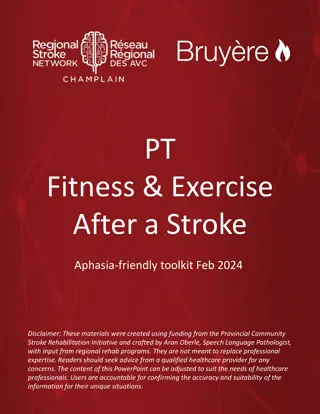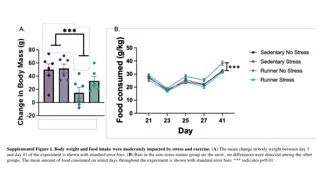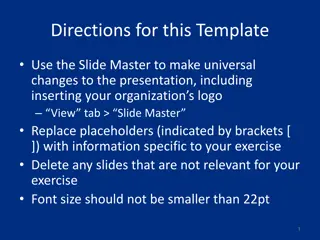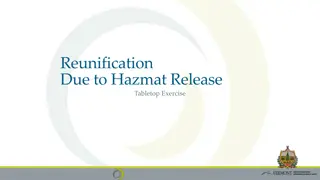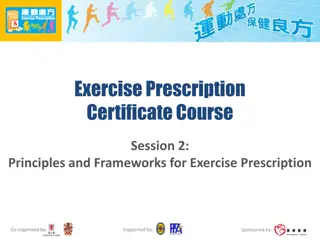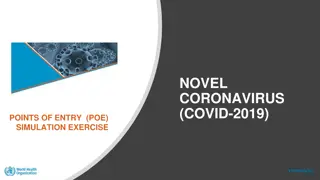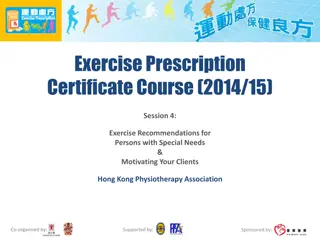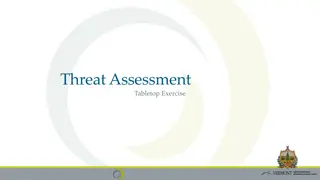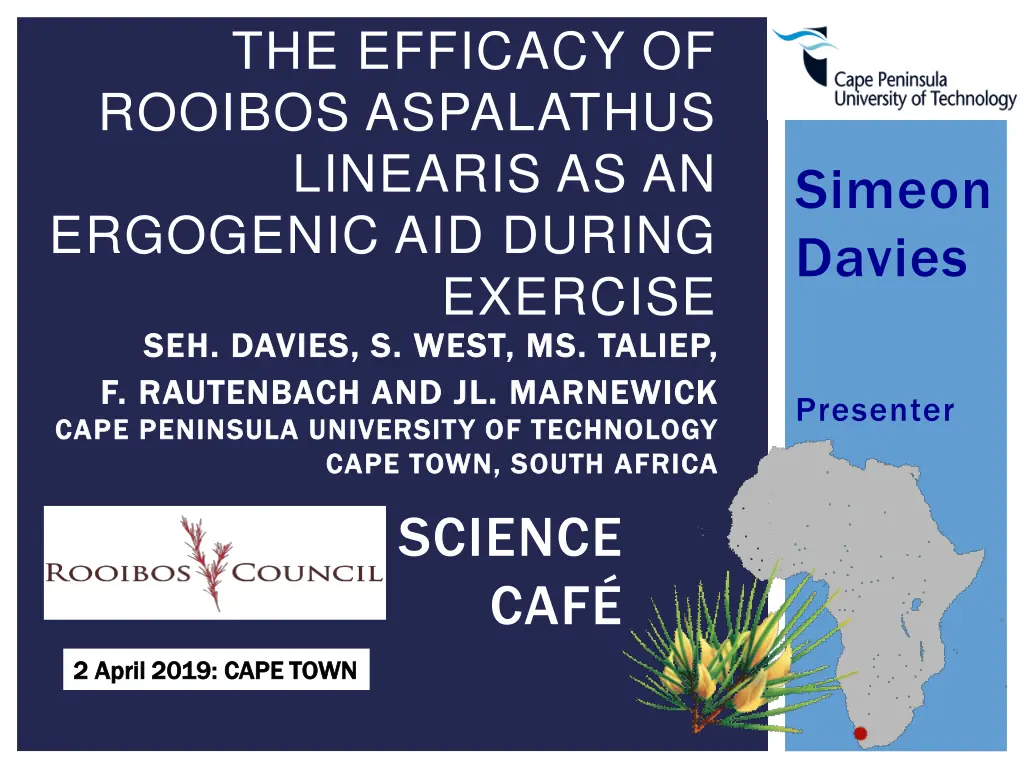
Efficacy of Rooibos Aspalathus Linearis as an Ergogenic Aid During Exercise
Discover the potential benefits of Rooibos Aspalathus linearis, a caffeine-free herbal tea rich in antioxidants, in enhancing exercise performance and combating oxidative stress. Explore the research on antioxidant supplementation and its effects on oxidative stress during physical activity. Learn about the bio-activity of Rooibos tea in modulating fatigue and potentially preventing acute mountain sickness.
Download Presentation

Please find below an Image/Link to download the presentation.
The content on the website is provided AS IS for your information and personal use only. It may not be sold, licensed, or shared on other websites without obtaining consent from the author. If you encounter any issues during the download, it is possible that the publisher has removed the file from their server.
You are allowed to download the files provided on this website for personal or commercial use, subject to the condition that they are used lawfully. All files are the property of their respective owners.
The content on the website is provided AS IS for your information and personal use only. It may not be sold, licensed, or shared on other websites without obtaining consent from the author.
E N D
Presentation Transcript
THE EFFICACY OF ROOIBOS ASPALATHUS LINEARIS AS AN ERGOGENIC AID DURING ? Simeon Davies EXERCISE SEH SEH. DAVIES . DAVIES, , S. WEST, MS. F. RAUTENBACH AND RAUTENBACH AND JL. CAPE PENINSULA UNIVERSITY OF TECHNOLOGY CAPE PENINSULA UNIVERSITY OF TECHNOLOGY CAPE TOWN, SOUTH CAPE TOWN, SOUTH AFRICA S. WEST, MS. TALIEP JL. MARNEWICK MARNEWICK TALIEP, , F. Presenter AFRICA SCIENCE CAF 2 April 2019: 2 April 2019: CAPE CAPE TOWN TOWN
Exogenous antioxidant supplementation is often derived from herbal plants that have abundant polyphenols that act as chain breaking antioxidants and mop up active oxygen species
ROOIBOS ASPALATHUS LINEARIS Rooibos Aspalathus linearis is naturally caffeine free and contains very low levels of tannins and is known to have antioxidant qualities. The utilization of rooibos was commonplace among the First Nation people (Khoisan) of the Western Cape, South Africa.
RESEARCH QUESTION RESEARCH QUESTION Rooibos herbal tea may possess a bio- activity, such as antioxidant capacity to modulate the deleterious effects of fatigue during exercise and furthermore mitigate the onset of acute mountain sickness at altitude.
ANTIOXIDANT SUPPLEMENTATION There continues to be considerable debate regarding the effect of antioxidant supplementation on oxidative stress during exercise in humans. Much of the research thus far has tended to concern itself almost exclusively within the field of sport and exercise science.
REACTIVE OXYGEN SPECIES (ROS) AND REACTIVE NITROGEN SPECIES (RNS) Ristow et al. (2009) highlight the dilemma that while exercise may induce undeniable health benefits, on the other hand exercise may also increase mitochondrial formation of reactive oxygen species (ROS) and reactive nitrogen species (RNS), which can cause cellular damage.
The symptoms of exercise-induced oxidative injury include muscle soreness, fatigue, and increased recovery time.
FREE RADICALS When produced in excess, free radicals promote cellular oxidation, damage in the DNA structure, resulting in aging and a variety of diseases such cancer, neurodegenerative diseases, arteriosclerosis amongst others, and furthermore impair skeletal muscle function that may cause pain and, thereby affecting exercise performance.
AIMS OF THE AIMS OF THE TWO EXERCISE TWO EXERCISE STUDIES STUDIES The main aim of the study was to assess whether ingesting rooibos polyphenols prior to a repeated arm flexion/extension fatiguing exercise protocol (isokinetic controlled movement at 60 degrees per second) to exhaustion could result in enhanced physical performance (demonstrated by increased force (Nm) output). In one trial the dose was acute, in the second trial it was chronic (over 4 weeks)
METHODOLOGY Single blinded, cross over placebo controlled study with 32 male participants in chronic trial and 40 participants in acute trial (approximately 22,2 years). In chronic trial participants consumed three capsules of rooibos extract or placebo a day for 4 weeks prior to test. In acute trial on the day of the test three capsules of a rooibos extract or placebo were prior to test. In both trials the participants consumed a standardised breakfast snack prior to testing. Participants recorded 3 non-consecutive day food records before each test intervention. None were taking any dietary supplements. Study conforms to the principles of the Helsinki Accord and was approved by institutional ethics committee.
MAXIMAL FATIGUING ELBOW FLEXION/EXTENSION A maximal fatiguing elbow flexion/extension exercise including 5 sets of 15 all-out voluntary contractions separated by 10- second intervals on a Biodex System 3 at a speed of 60 per second.
ARM FLEXION PEAK TORQUE 50 48 Peak torque output in Nm Peak torque output in Nm 46 44 42 Placebo Rooibos 40 38 36 34 32 1 Arm flexion exercise bouts (1 Arm flexion exercise bouts (1- -5) 30 sec duration each 2 3 4 5 5) 30 sec duration each
CONCLUSIONS This study indicated that individuals who ingested rooibos Aspalathus linearis prior to a repetitive fatiguing exercise protocol generated a significantly (p<0.05) improved flexion force output (Nm) in the acute dose trial and an overall elevated level of force in the chronic trial.
CONCLUSION REGARDS ROOIBOS FOR EXERCISE It is tentatively suggested that a person engaged in exercise tasks of a repetitive nature requiring forceful actions may benefit from supplementing his/her diet with rooibos Aspalathus linearis a recognized antioxidant, because it may improve performance and reduce perceived and actual physical fatigue.
Rooibos Aspalathus Linearis Simeon Davies daviess@cput.ac.za THANK YOU




